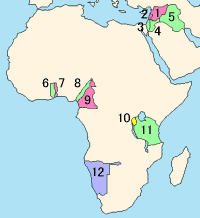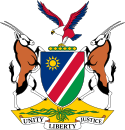
A League of Nations mandate was a legal status for certain territories transferred from the control of one country to another following World War I, or the legal instruments that contained the internationally agreed-upon terms for administering the territory on behalf of the League of Nations. These were of the nature of both a treaty and a constitution, which contained minority rights clauses that provided for the rights of petition and adjudication by the International Court.
The history of Western Sahara can be traced back to the times of Carthaginian explorer Hanno the Navigator in the 5th century BC. Though few historical records are left from that period, Western Sahara's modern history has its roots linked to some nomadic groups such as the Sanhaja group, and the introduction of Islam and the Arabic language at the end of the 8th century AD.

South West Africa was the name for modern-day Namibia when it was under South African administration, from 1915 to 1990.

The Union of South Africa is the historical predecessor to the present-day Republic of South Africa. It came into being on 31 May 1910 with the unification of the Cape Colony, the Natal Colony, the Transvaal, and the Orange River Colony. It included the territories that were formerly a part of the South African Republic and the Orange Free State.
The history of Namibia has passed through several distinct stages from being colonised in the late nineteenth century to Namibia's independence on 21 March 1990.
Secession is the withdrawal of a group from a larger entity, especially a political entity, but also from any organization, union or military alliance. Threats of secession can be a strategy for achieving more limited goals. It is, therefore, a process, which commences once a group proclaims the act of secession. It could involve a violent or peaceful process but these do not change the nature of the outcome, which is the creation of a new state or entity independent from the group or territory it seceded from.
Devolution is the statutory delegation of powers from the central government of a sovereign state to govern at a subnational level, such as a regional or local level. It is a form of administrative decentralization. Devolved territories have the power to make legislation relevant to the area and thus granting them a higher level of autonomy.

The Orange Free State was an independent Boer sovereign republic in Southern Africa during the second half of the 19th century, which ceased to exist after it was defeated and surrendered to the British Empire at the end of the Second Boer War in 1902. It is the historical precursor to the present-day Free State province.

The Emirate of Transjordan, officially known as the Amirate of Trans-Jordan, was a British protectorate established in April 1921.

British Togoland, officially the Mandate Territory of Togoland and later officially the Trust Territory of Togoland, was a territory in West Africa, under the administration of the United Kingdom. It was effectively formed in 1916 by the splitting of the German protectorate of Togoland into two territories, French Togoland and British Togoland, during the First World War. Initially, it was a League of Nations Class B mandate. In 1922, British Togoland was formally placed under British rule while French Togoland, now Togo, was placed under French rule.

The decolonization of Africa took place in the mid-to-late 1950s to 1975, with sudden and radical regime changes on the continent as colonial governments made the transition to independent states; this was often quite unorganized and marred with violence and political turmoil. There was widespread unrest and there were organized revolts in both Northern and sub-Saharan colonies, especially in French Algeria, Portuguese Angola, the Belgian Congo and British Kenya.

A referendum on becoming a republic was held in South Africa on 5 October 1960. The Afrikaner-dominated right-wing National Party, which had come to power in 1948, was avowedly republican, and regarded the position of Queen Elizabeth II as head of state as a relic of British imperialism. The National Party government subsequently organised the referendum on whether the then Union of South Africa should become a republic. The vote, which was restricted to whites, was narrowly approved by 52.29% of the voters. The Republic of South Africa was constituted on 31 May 1961.

Southern Cameroons was the southern part of the British Mandate territory of British Cameroons in West Africa. Since 1961 it has been part of the Republic of Cameroon, where it makes up the Northwest Region and Southwest Region. Since 1994, pressure groups in the territory have sought independence from the Republic of Cameroon, and the Republic of Ambazonia was declared by the Southern Cameroons Peoples Organisation (SCAPO) on 31 August 2006.

The State of Somaliland was a short-lived independent country in the territory of present-day de facto independent Republic of Somaliland. It was the name assumed by the former British Somaliland protectorate in the five days between June 26, 1960 and July 1, 1960, when the territory prepared for union as scheduled with the Trust Territory of Somaliland under Italian Administration to form the Somali Republic, the first incarnation of modern-day Somalia.
The African Independence Movements took place in the 20th century, when a wave of struggles for independence in European-ruled African territories were witnessed.

Colonial Nigeria was the era in the History of Nigeria when the region of West Africa was ruled by Great Britain in from the mid-19th century to 1960. British influence in the region began with the prohibition of slave trade to British subjects in 1807. Britain annexed Lagos in 1861 and established the Oil River Protectorate in 1884. British influence in the Niger area increased gradually over the 19th century, but Britain did not effectively occupy the area until 1885. Other European powers acknowledged Britain's dominance over the area in the 1885 Berlin Conference.

Mauritania, officially the Islamic Republic of Mauritania, is a country in Northwest Africa. It is the eleventh largest sovereign state in Africa and is bordered by the Atlantic Ocean to the west, Western Sahara to the north and northwest, Algeria to the northeast, Mali to the east and southeast, and Senegal to the southwest.
Foreign relations of South Africa during apartheid are studied as the foreign relations of South Africa between 1948 and the early 1990s. South Africa introduced apartheid in 1948, as a systematic extension of pre-existing racial discrimination in the country. Initially the regime implemented an offensive foreign policy trying to consolidate South African hegemony over Southern Africa. These attempts had clearly failed by the late 1970s. As a result of its racism and foreign interventionism in Angola and the occupation of Namibia, the country became increasingly isolated internationally.

French Cameroon or French Cameroons was a League of Nations Mandate territory in Central Africa. It now forms part of the independent country of Cameroon.












